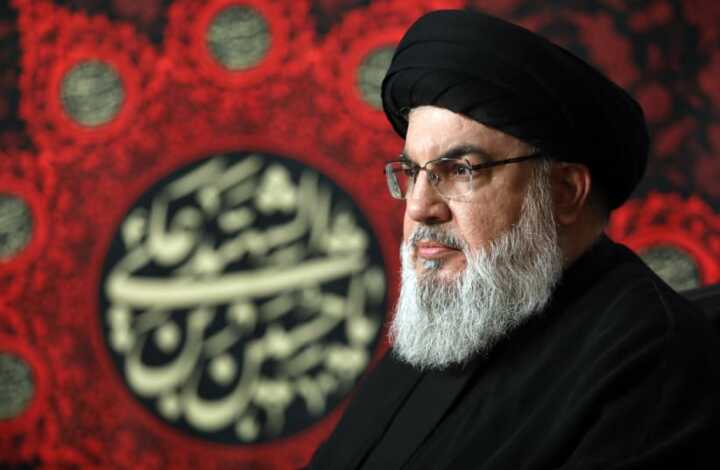
IDF says southern front commander Ali Karki also killed and other Hezbollah commanders in Beirut underground headquarters
The Israeli military has said it has killed Hezbollah’s leader, Sayyed Hassan Nasrallah, in a series of strikes on a southern suburb of Beirut. The Israel Defense Forces (IDF) said it had targeted Hezbollah’s underground headquarters.
The announcement by the IDF on Saturday morning came after overnight speculation about Nasrallah’s fate, the leader of Hezbollah for three decades.
According to sources in Israel, the Israeli security cabinet had previously pulled back from plans to kill Nasrallah, but having established that the Hezbollah leader was due to attend a meeting at the command complex, approved a plan to kill him.
Reports in the Israel media said the assassination of Nasrallah had been carried out by a squadron of Israel’s F15I jets equipped with bunker-busting bombs.
The news was initially broken by the military spokesperson Lt Col Nadav Shoshani in a brief post on X saying: “Hassan Nasrallah is dead.”
In a statement issued shortly afterwards, the IDF said Nasrallah had been killed along with Hezbollah’s southern front commander, Ali Karki, as well as other Hezbollah commanders who were attending the meeting.
“Following precise intelligence from the IDF and the Israeli security establishment, IAF fighter jets conducted a targeted strike on the central headquarters of the Hezbollah terrorist organisation which was located underground, embedded under a residential building in the Dahieh area of Beirut,” the statement said.
“The strike was conducted while Hezbollah’s senior chain of command was operating form the headquarters and advancing terrorist activities against citizens of the state of Israel.”
Following the claim that it had killed Nasrallah, the Israeli military said it was on “high alert” and prepared for a wider escalation.
Hezbollah has yet to make a statement on Israel’s claim that it killed its leader.
In Lebanon, residents reacted to the news of Nasrallah’s apparent death with shock, unwilling to believe Israel’s claims.
In reports of the killing, on resident from Dahieh said: “I’m in despair, I don’t know what to feel.” Other supporters of the group struck a braver tone. “The group will go on, it’s not just centered around one leader,” Fatimah, a resident of Dahieh, said from her car in downtown Beirut where she has been sleeping with her husband and son since the strikes on Dahieh started last week.
Number two in the organisation, Hashem Safieddine, who could succeed Nasrallah, was reportedly also targeted on Friday in Israel’s airstrike on Beirut. It is unknown how the next leader of Hezbollah might govern the group and how they will choose to retaliate for Nasrallah’s killing.
Israel’s chief of staff, Herzi Halevi, said on Saturday that the elimination of Nasrallah was “not the end of our toolbox”, indicating that more strikes were planned. He said that the strike targeting Hezbollah leadership was the result of a long period of preparation.
The claim of Nasrallah’s killing came as the Israeli military said it was mobilising additional reserve soldiers as tensions escalate with Lebanon, activating three battalions of reserve soldiers to serve across the country.
The call comes after it sent two brigades to northern Israel earlier in the week to train for a possible ground invasion.
The killing also threatens to involve Iran, Hezbollah’s principal backer, which thus far has been reluctant to involve itself in the fighting between its Lebanese ally and Israel. Iran’s embassy in Beirut said on X that Israel’s strike on Dahieh was a “dangerous gamechanging escalation that changes the rules of the game” and warned that its perpetrator would be “punished appropriately”.
Shortly before Israel carried out the strike on what it said was Hezbollah’s main military headquarters in Beirut, the Israeli prime minister, Benjamin Netanyahu, vowed to keep fighting in Lebanon during a speech at the UN general assembly in New York, crushing hope that Israel would agree to a 21-day truce proposed by the US and France.
“There is no place in Iran that the long arm of Israel cannot reach, and that is true of the entire Middle East,” Netanyahu thundered at the UN podium.
Among Hezbollah’s constituents, Nasrallah was viewed with a prophet-like fervour, seen as the liberator of south Lebanon from Israel’s 18-year occupation. At Hezbollah rallies, supporters chant “Labaik ya Hussein and Labaik ya Nasrallah” – “O Hussein, O Nasrallah, I am here for you” – shouting their devotion to Hussein, a key figure in Shia Islam, and Nasrallah.
When Nasrallah spoke, his televised addresses beamed to cafes and homes across Lebanon, supporters would tune in for guidance on political, spiritual and cultural issues. Many Lebanese attribute the failure of the 2019 revolution to a speech by Nasrallah, when he told his supporters it was time to get off the streets, depriving the protest movement of its non-sectarian character.
Hezbollah’s death leaves Hezbollah’s public face essentially leaderless. Whoever replaces the enigmatic former secretary general will have to deal with an organisation that over the last year, has lost almost every senior military leader and is on the backpedal from an Israeli bombing campaign across Lebanon.
The death of the leader also throws the fate of the Lebanese state into question. Hezbollah is deeply embedded in the state, controlling a key share of parliament and exercising influence over several ministries such as the directorate of general security. Lebanon’s foreign policy is largely dictated by the group, particularly when it comes to neighbouring states like Israel.
Hezbollah began firing into Israel one day after Hamas’s 7 October attack on southern Israel that sparked the war in Gaza.
Israel has in recent days shifted the focus of its operation from Gaza to Lebanon, where heavy bombing has killed more than 700 people and displaced about 118,000.